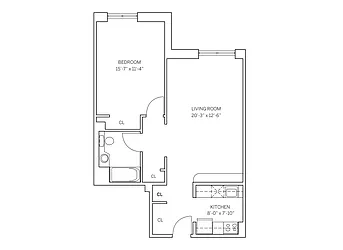The COVID-19 pandemic radically transformed the workplace — and likely for good. The “new normal” means that more people are working remotely than ever before. Millions have moved out of the state where their company is based, often to be closer to family during quarantine or to take advantage of living somewhere that offers more space and affordability. (For some, that was a move far away, for others, it was merely a trip across the river to a place like Hoboken or Jersey City.) So what does this mean if you no longer commute to a job in the same state? Specifically, if you now live in New Jersey but work in NYC, where do you pay your taxes? While situations have become more complex, the taxation laws have mostly remained the same — at least for now. But there are a few things to be aware of as you prepare your 2023 tax return.
We also have tax refund advice for New York City residents.
Hoboken Rentals Under $3,000 on StreetEasy Article continues below
Do You Need to File Tax Returns in New York and New Jersey?
Yes. New Jersey residents who work in New York State must file a New York Nonresident Income Tax return (Form IT-203) as well as a New Jersey Resident Income Tax Return (Form NJ-1040). Your employer will have withheld New York state taxes throughout the year but you’ll need to file in New Jersey as well.
Do You Need to Pay Taxes in Both NY and NJ?
Technically, you are being double-taxed. The good news is that you will gain a New Jersey credit back for those taxes being paid to New York. However, “this is not a dollar-for-dollar exchange,” says Mark Feinberg, CPA of Feinberg & Company, which has offices in both Manhattan and Fair Lawn, New Jersey. The state of New Jersey uses a formula to calculate the maximum percentage that can be credited back to you, though it is usually a substantially large portion.
Also, keep in mind that other income — interest, dividends, capital gains, etc. — is still taxed based on where it is sourced. For example, if you sold an apartment in New York City, you will be subject to New York capital gains rules.
Jersey City Rentals Under $3,000 on StreetEasy Article continues below
Do You Need to Pay a Commuter Tax?
If you are a salaried worker, then you don’t. Your New York employer pays for the commuter tax, called the Metropolitan Commuter Transportation Mobility Tax (MCTMT).
But if you’re self-employed and earn more than $50,000, then you pay a flat 0.34 percent of your total net earnings.
What Do Remote Workers Need to Know for 2023 Tax Returns?
While New Jersey has a reciprocal tax agreement with Pennsylvania, where you are only taxed in the state where you’re physically working, it does not have a similar agreement with New York. New Jersey lawmakers are endeavoring to change that, as are senators and representatives in Congress, but as of March 2023, there have been no developments on that front, so you still need to file returns for both states.
Here are some tips on navigating the dual-state situation on your 2023 tax return.
Pause Before You Upgrade Your Home Office
This may seem like a great opportunity to include some big-ticket home office deductions. However, “those deductions are not available to salaried workers but are only for non-salaried workers (contractors) and specialized workers (qualified performing artists, army reservists, etc.),” says Bryan Engel, president of Engeltax Inc. in Westfield, New Jersey. So even if you’re working fully remotely, you won’t be able to write off that fancy new laser printer if you are on staff at your company.
It Might Make Sense to Stay Where You Are
“One advantage to living in New Jersey while working for a New York City–based company is you won’t be subject to any NYC taxes, as those city taxes are only relevant to taxpayers who reside in NYC for all, or part, of the year,” notes Engel. “Since NYC’s city tax rate is over three percent, that’s a significant saving.” So if you’re thinking of moving back to NYC in the near future, you might want to reconsider and stay put.
Inquire if Your Company Has a New Jersey Office
If you’re a fully remote worker in New Jersey and your company has a satellite office in that state, Engel notes that it’s worthwhile to ask whether that outpost location could be considered your home base. “If your employer is amenable to designating you as a New Jersey employee, you will only pay New Jersey taxes,” he says. This would simplify your tax filing process considerably.
Jersey City Homes Under $750,000 on StreetEasy Article continues below
What If You’re a Freelancer in NJ Who Has Clients Based in NY?
“If you don’t actually step into any of your clients’ offices in New York, then you can claim that work as New Jersey income,” says Feinberg, because 1) your business operates entirely out of your home office in New Jersey and 2) all of the work is conducted at home. Likewise, if you attend meetings in New York, but the bulk of the actual work takes place at home, then you can consider that to be New Jersey income.
What gets more complicated is if you are a freelancer and have to work in other states. “Ideally, you would file in every state that you work in,” says Feinberg, but that can become complicated if you are traveling to work in multiple other states, not just New York.
Feinberg notes that each case is unique with its own circumstances. “You have to look at many factors,” he says. “If the clients are based in New York, if the checks are written in New York, if your bank account is in New York, etc. These help determine where you should file. The key is to look at the source state of the income.”
What If Your Employer Is in NY and You Perform Services Out of State?
The same holds true if your employer sends you to work in another state. For example, if you’re a New York sales associate who’s assigned to Connecticut as your territory. Again, you should consider where your checks are coming from. It may be advantageous for you to allocate a certain portion of your income to another state, especially if the other state has a lower tax rate, but that can also make filing more complicated, as you’d have to file in New Jersey (where you reside), New York (where your employer is based), and that third state (where you’re assigned to work).
For those whose companies assign them to clients in other cities or who must set up a temporary work base in other cities, you may have to pay taxes in those states, depending on the amount earned. “Check with your employer to determine where they are withholding taxes and with a tax professional to determine whether taxes may be due in the state that you worked,” advises Engel.
Hoboken Homes Under $750K on StreetEasy Article continues below
What If You’re Collecting Unemployment from NY but Live in NJ?
“New Jersey doesn’t tax unemployment compensation, but you will need to pay non-resident New York State taxes on this income,” says Engel. In addition, unemployment is fully taxable at the federal level.
Engel notes that it’s important to deduct both federal and New York state taxes from unemployment income to avoid any surprises on your 2023 tax return.
It May Pay to Bring in a Professional
One final consideration given the upheaval of the past few years: You might want to work with a professional on your 2023 tax return. “Every year, hundreds of millions of dollars in refunds get left on the table across the country,” Engel says.
Since you can file amendments up to three years into the past, he recommends having a tax professional review your previous filings. Given the nature of the pandemic and ongoing economic issues, it pays to make sure you are maximizing every dollar of your tax returns.


























































